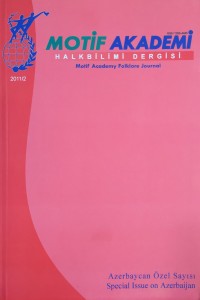Abstract
In X grade of secondary schools are taught Azerbaiyani classical literature. The article gives the results of investigations in the sphere of problems of learning classical literature. Problem of the connectivity analysis of classic works with ideas sufism and hurufizm in the process of the teaching literary works investigation in the article. In the article it is told about necessity of studying this problem and some ways of their application are shown at teaching. The article in tuch the essence, causes, impact ideas sufism and hurufizm on the Azerbaijan literature in the muslim east of the middle ages. The author reports important role knowledges about sufism and hurufism in understanding classical art works in X grade secondary schools and grounds that these ideas increase quality of teaching. But these knowledges must meet the level of training and the perception students of concrete class. And this promotes to successful reception of the formation at literature lessons.
Keywords
Abstract
Edebiyat derslerinde bir çok klasiklerin, – İmadeddin Nesimi, Fuzuli, Şah İsmail Hatai – sufistik şiirler yazan sanatkarların edebi kişiliğinin öğrenimi zamanı öğrencilere ilkin sufizm ve hurufizmin mahiyeti, felsefesi, fikirleri ve bakış açısı hakkında bilgi verilir. Gözlemlerimize göre, sufizm ve hurufizmi öğrenmeden, bu dini-felsefi bakış açısı sisteminin ne olduğunu kavramadan öğrencilerin klasik edebiyatımızın çoğu üyesinin edebi irsini derinden benimsemesi mümkün değil. Liselilere çağdaş edebiyat dersliklerinde bu meselelerin yeterince açıklanmaması zorlukların doğmasına sebep oluyor. Bu yüzden de 13. – 14. Yüzyıllar edebiyatının öğretilmesi zamanı öğrencilere sufizmin ve hurufizmin mahiyetini, farklı yönlerini anlatmak icap ediyor. Okul tecrübesine göre, öğrenciler, bu tarikatların ayrımını yapamıyor ve sonuçta öğrenilen eserin ana fikrini kavramakta zorlanıyorlar.
Keywords
Details
| Other ID | JA88DE89FZ |
|---|---|
| Journal Section | Articles |
| Authors | |
| Publication Date | December 1, 2011 |
| Submission Date | December 1, 2011 |
| Published in Issue | Year 2011 Volume: 4 Issue: 8 |

